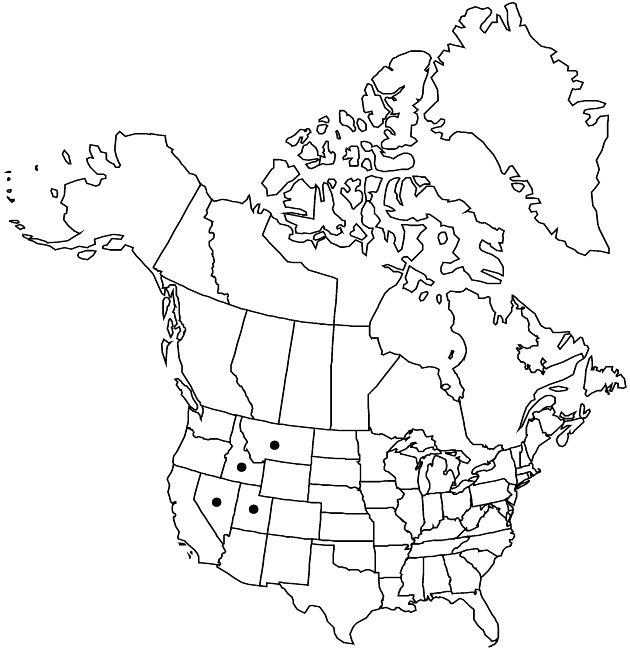Difference between revisions of "Erigeron asperugineus"
Notes Compositae, 91. 1880.
FNA>Volume Importer |
FNA>Volume Importer |
||
| Line 27: | Line 27: | ||
|elevation=(2100–)2500–3300 m | |elevation=(2100–)2500–3300 m | ||
|distribution=Idaho;Mont.;Nev.;Utah. | |distribution=Idaho;Mont.;Nev.;Utah. | ||
| − | |discussion=<p>Erigeron asperugineus sometimes is very similar in aspect to E. clokeyi var. pinzliae; the latter differs in its narrower leaves, coarsely ciliate petioles, broader and non-reflexing rays, and shorter cypselae.</p> | + | |discussion=<p><i>Erigeron asperugineus</i> sometimes is very similar in aspect to <i>E. clokeyi </i>var.<i> pinzliae</i>; the latter differs in its narrower leaves, coarsely ciliate petioles, broader and non-reflexing rays, and shorter cypselae.</p> |
|tables= | |tables= | ||
|references= | |references= | ||
| Line 51: | Line 51: | ||
|publication year=1880 | |publication year=1880 | ||
|special status= | |special status= | ||
| − | |source xml=https://jpend@bitbucket.org/aafc-mbb/fna-data-curation.git/src/ | + | |source xml=https://jpend@bitbucket.org/aafc-mbb/fna-data-curation.git/src/8f726806613d60c220dc4493de13607dd3150896/coarse_grained_fna_xml/V19-20-21/V20_663.xml |
|tribe=Asteraceae tribe Astereae | |tribe=Asteraceae tribe Astereae | ||
|genus=Erigeron | |genus=Erigeron | ||
Revision as of 15:25, 18 September 2019
Perennials, 2–20 cm; slenderly taprooted, caudices usually branched. Stems usually decumbent-ascending, moderately to densely hirsutulous to hirtellous (hairs usually deflexed), eglandular. Leaves basal (persistent) and cauline; basal blades 1-nerved or weakly 3-nerved, spatulate, rhombic-elliptic to obovate or oblanceolate (often folding), 20–50(–80) × 3–10(–13) mm, cauline gradually or abruptly reduced and linear distally (bases abruptly contracted to petioles), margins entire, faces moderately to densely hirsutulous, eglandular. Heads 1(–2). Involucres 5–9 × 7–14 mm. Phyllaries in 3–4 series (tips and margins often purple), sparsely to moderately hirsutulous, densely minutely glandular. Ray florets 10–25; corollas deep blue or violet to rose-purple, 5–10 mm, laminae not coiling or reflexing. Disc corollas 4.2–6.3 mm. Cypselae 2.5–3.1 mm, 2-nerved, faces sparsely strigose; pappi: outer of setae, inner of 20–30 bristles.
Phenology: Flowering Jul–Aug.
Habitat: Rocky or gravelly slopes and ridges, talus, sagebrush or meadow edges, limber pine, whitebark pine, fir-pine
Elevation: (2100–)2500–3300 m
Distribution

Idaho, Mont., Nev., Utah.
Discussion
Erigeron asperugineus sometimes is very similar in aspect to E. clokeyi var. pinzliae; the latter differs in its narrower leaves, coarsely ciliate petioles, broader and non-reflexing rays, and shorter cypselae.
Selected References
None.